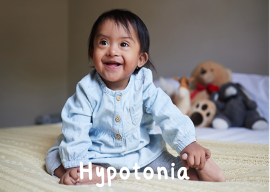
Therapy for hypotonia
Children diagnosed with hypotonia have low or decreased muscle tone, not to be confused with strength. These children may feel very loose or limp when you hold them. It can be a condition on its own or it can be indicative of something different like cerebral palsy or muscular dystrophy. Kids with lower tone may be behind in motor skills and develop late as crawlers and walkers. They may also struggle with feeding and speech as tone can affect the lips, cheeks and tongue.
Causes:
There is a large range of causes of hypotonia including:
- Hypotonia can be congenital, meaning it is present at birth, or acquired, meaning it can develop later in life
- Genetic conditions- like Down syndrome or Prader-Willi syndrome
- Neurological disorders- like spinal muscular atrophy or cerebral palsy
- Muscular disorders
- Metabolic disorders
- Certain medical conditions
Impact of hypotonia
The impact of hypotonia depends on the overall severity as children can display a range of low tone from very mild to severe. It can affect a small area of the body or the whole body depending on the cause. Typically, children with hypotonia may display delays in achieving motor milestones, such as lifting their heads, rolling over, sitting, standing and walking. They can have difficulty completing activities that required a strong stable base and coordinated movements. Children with hypotonia may have a hard time maintaining proper posture and stability without propping themselves on their surroundings. This can affect their balance and coordination.
Hypotonia can also impact joint hyper-mobility where joints have an unusual range of motion and are not stable. This can increase the risk of injuries or other conditions that impact the joints. It can also increased fatigue during longer writing tasks as the hand is working extra hard to stabilize the joints.
Treatment
Treatment typically involves a group of multidiscipline practitioners including speech, occupational and physical therapists. Therapy focuses on strengthening muscles, improving coordination, providing sensory stimulation, and use of adaptive techniques, .
If your child was diagnosed with hypotonia or you think they might be struggling with weakness, call today.